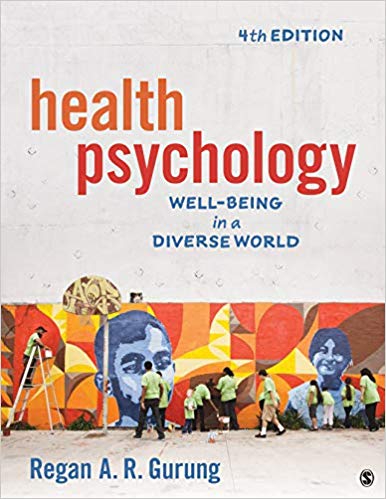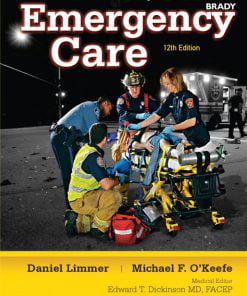Test Bank for Health Psychology Well-Being in a Diverse World 4th by Gurung
$35.00 Original price was: $35.00.$26.50Current price is: $26.50.
Test Bank for Health Psychology Well-Being in a Diverse World 4th by Gurung
This is completed downloadable of Test Bank for Health Psychology Well-Being in a Diverse World 4th by Gurung
Product Details:
- ISBN-10 : 1506392369
- ISBN-13 : 978-1506392363
- Author: REGAN A. R. GURUNG
Health Psychology: Well-Being in a Diverse World introduces students to the main topics and issues in health psychology through a unique perspective focused on diversity. Using a conversational tone, author Regan A. R. Gurung explores the key determinants of behavior―such as family, environment, ethnicity, and religion―and connects concepts to personal experiences for students to gain a deeper understanding and appreciation of the material. Extensively updated based on over 1,000 new articles cited, and with a new chapter on research methods, the Fourth Edition reflects the latest cutting-edge research in the field to explain more thoroughly how context and culture are important predictors of healthy behavior.
Table of Content:
- Preface
- About the Author
- Part I. Foundations of Health Psychology
- Chapter 1 What Is Health? Cultural and Historical Roots
- Measuring Up: How Healthy Are You?
- Ponder This
- What Is Health?
- Cross-Cultural Definitions of Health
- Why Is Culture Important?
- Dimensions of Culture
- Defining Culture
- Profile of a Multicultural America
- Two Key Areas of Diversity
- Advancing Cultural Competence
- Health Psychology’s Biopsychosocial Approach
- The Evolution of Health Psychology
- What Is Health Psychology?
- Main Areas in Health Psychology
- APPLICATION SHOWCASE: Careers and Graduate Training in Health Psychology
- SUMMARY
- TEST YOURSELF
- KEY TERMS, CONCEPTS, AND PEOPLE
- ESSENTIAL READINGS
- Chapter 2 Doing Health Psychology: Research Methods
- Measuring Up: Is Psychology a Science?
- Ponder This
- Common Rubrics for Health
- A Research Primer
- Key Steps to Doing Research
- Major Research Designs
- Ensuring Strong Measurement
- Getting Statistically Savvy
- Common Statistical Tests
- Context and Level of Analysis
- Moderators versus Mediators
- Some Final Warnings
- APPLICATION SHOWCASE: The Replication Crisis in Psychology
- SUMMARY
- TEST YOURSELF
- KEY TERMS, CONCEPTS, AND PEOPLE
- ESSENTIAL READINGS
- Chapter 3 Cultural Approaches to Health
- Measuring Up: Are You Culturally Competent?
- Ponder This
- Varieties of World Medicine
- Western Biomedicine
- Greek Roots
- Technological Innovations
- Traditional Chinese Medicine
- Sources of Illness
- Treatment
- Ayurveda: Traditional Indian Medicine
- Sources of Illness
- Treatment
- Curanderismo and Spiritualism
- Sources of Illness
- Treatment
- American Indian Medicine
- Sources of Illness
- Treatment
- African American Beliefs
- Are Complementary and Alternative Approaches Valid?
- APPLICATIONS SHOWCASE: Acupuncture
- SUMMARY
- TEST YOURSELF
- KEY TERMS, CONCEPTS, AND PEOPLE
- ESSENTIAL READINGS
- Chapter 4 Essential Physiology
- Measuring Up: Know Your Vital Stats
- Ponder This
- Biological Development
- The Prenatal Period
- Infancy and Early Childhood
- Adolescence
- Adulthood and Aging
- The Nervous System
- The Central Nervous System
- The Peripheral Nervous System
- The Endocrine System
- Key Components and Mechanics
- The Circulatory System
- Key Components
- The Mechanics of Circulation
- A Biological Primer
- The Digestive System
- Key Components and Mechanics
- A Note on the Renal/Urinary System
- The Physiology of Immunity
- The Process of Defense
- Nonspecific or Natural Immunity
- Acquired Immunity
- Measures of Immune Response
- The Respiratory System
- Key Components and Mechanics
- What About Culture?
- APPLICATION SHOWCASE: The Games We Play (Can Have Physiological Implications)
- SUMMARY
- TEST YOURSELF
- KEY TERMS, CONCEPTS, AND PEOPLE
- ESSENTIAL READINGS
- Part II. Stress and Coping
- Chapter 5 Diverse Understandings of Stress
- Measuring Up: Got Daily Hassles? What’s Your Stress Score?
- Ponder This
- What Is Stress?
- Measuring Stress
- Stress over Time
- Main Theories of Stress
- Cannon’s Fight-or-Flight Theory
- Taylor et al.’s Tend-and-Befriend Theory
- Selye’s General Adaptation Syndrome
- Lazarus’s Cognitive Appraisal Model
- Factors Influencing Our Appraisals
- The Role of Culture in Appraisal
- Stress and Psychopathology: The Diathesis-Stress Model
- Culture as a Critical Stressor
- Perceived Discrimination
- Stress, Hormones, and Genes
- Different Varieties of Stressors
- Relationship Stress
- Work Stress
- Environmental Stress
- Consequences of Stress
- Post-Traumatic Stress Disorder
- APPLICATION SHOWCASE: Stress Really Can Kill: The Baskerville Effect, Culture, and Stress
- SUMMARY
- TEST YOURSELF
- KEY TERMS, CONCEPTS, AND PEOPLE
- ESSENTIAL READINGS
- Chapter 6 Coping and Social Support
- Measuring Up: How Do You Cope?
- Ponder This
- What Is Coping?
- Common Measures of Coping
- The COPE
- Other Coping Questionnaires
- New Developments in Coping Research
- The Structure of Coping
- What Is the Best Way to Cope?
- Who Copes Well?
- Personality and Diverse Coping Styles
- Coping and Culture
- Ethnic Identity
- Acculturation
- Social Support
- Types of Social Support
- Cultural Variables in Social Support
- Theories of Social Support Change
- Keys to Coping with Stress
- Relaxation-Based Approaches
- Cognitive-Behavioral Approaches
- APPLICATION SHOWCASE: May God Help You
- SUMMARY
- TEST YOURSELF
- KEY TERMS, CONCEPTS, AND PEOPLE
- ESSENTIAL READINGS
- Part III. Health Behaviors
- Chapter 7 Why Don’t We Do What We Need To? Models of Behavior Change
- Measuring Up: What Do You Believe About Exercising?
- Ponder This
- What Are Healthy Behaviors?
- The Healthy People Programs
- What Determines Health Behaviors?
- Biological Factors
- Psychological Factors
- Social Factors
- Changing Health Behaviors
- The Importance of Theory
- Key Theories of Health Behavior Change
- Transtheoretical Model
- The Health Belief Model
- Culture and the Health Belief Model
- Theory of Planned Behavior
- Culture and the Theory of Planned Behavior
- Additional Theories of Health Behavior Change
- Comparing the Models and Their Limitations
- Changing Behaviors: Interventions
- APPLICATION SHOWCASE: You Know You Want To . . . : Reducing Smoking in College
- SUMMARY
- TEST YOURSELF
- KEY TERMS, CONCEPTS, AND PEOPLE
- ESSENTIAL READINGS
- Chapter 8 Health Behaviors: Eating, Being Active, Smoking, and Drinking
- Measuring Up: Are Your Behaviors Healthy?
- Ponder This
- Nutrition and Weight
- What Should We Be Eating?
- Development of Food Preferences
- Obesity
- Eating Disorders
- Culture and Eating Disorders
- Physical Activity
- Cultural Variations in Physical Activity
- Physical Consequences of Physical Activity
- Psychological Consequences of Physical Activity
- Smoking and Drinking
- Tobacco Use
- Cultural Variations in Smoking
- Why Do People Smoke?
- Psychological Causes of Addiction
- Physiological Consequences of Smoking
- Alcohol
- Who Drinks, How Much, and Why?
- Consequences of Alcohol Abuse
- APPLICATION SHOWCASE: The Truth About the Freshman 15
- SUMMARY
- TEST YOURSELF
- KEY TERMS, CONCEPTS, AND PEOPLE
- ESSENTIAL READINGS
- Part IV. Factors Surrounding Illness
- Chapter 9 Illness Cognitions, Adherence, and Patient–Practitioner Interactions
- Measuring Up: How Do You See Illness? The Brief Illness Perception Questionnaire
- Ponder This
- Culture and Illness Behaviors
- The Role of Acculturation
- The Commonsense Model of Illness Behavior
- Recognizing Symptoms
- The Confirmation Bias
- Attributions and Misattributions
- Personality
- Seeking Treatment
- The Role of Culture
- Understanding Delays
- The Hospital Setting
- Staff Relations
- Adherence to Treatment
- Patient–Practitioner Interactions
- Communication
- Gender and Cultural Stereotyping
- Cultural Competency
- APPLICATION SHOWCASE: When the Spirit Catches You, Cultures Clash
- SUMMARY
- TEST YOURSELF
- KEY TERMS, CONCEPTS, AND PEOPLE
- ESSENTIAL READINGS
- Chapter 10 Diverse Approaches to Pain
- Measuring Up: How Much Pain Are You In?
- Ponder This
- Key Definitions
- Cultural Variations in the Experience of Pain
- Sex Differences
- Ethnic Differences
- Typologies and Biology of Pain
- Measuring Pain
- Basic Pain Measures
- Theories of Pain
- Early Physiological and Psychological Approaches
- Biopsychological Theories of Pain
- The Gate Control Theory of Pain
- The Psychology of Pain
- Psychological Factors and Pain
- Pain Management Techniques
- Physiological Treatments
- Psychological Treatments
- Self-Management of Chronic Pain
- APPLICATION SHOWCASE: A Hospital Case Study
- SUMMARY
- TEST YOURSELF
- KEY TERMS, CONCEPTS, AND PEOPLE
- ESSENTIAL READINGS
- Chapter 11 Chronic Illness, Terminal Illness, and Death
- Measuring Up: How Satisfied Are You with Life?
- Ponder This
- Prevalence of Chronic Illnesses
- Coping with Chronic Illnesses
- Goals of Treatment
- Quality of Life
- Biopsychosocial Components of Adjustment
- Biological Issues
- Psychological Issues
- Culture and Chronic Illness
- Family and Neighborhoods
- Chronic Illness and Ethnicity
- Social Support
- Interventions
- Coping with Terminal Illness
- The Role of Religious Diversity
- Death
- Death Across the Life Span
- The Path to Death
- Facilitating Death
- Are There Stages?
- Cultural Variations in Death and Dying
- Sex, Gender, and Death
- APPLICATION SHOWCASE: Hospice
- SUMMARY
- TEST YOURSELF
- KEY TERMS, CONCEPTS, AND PEOPLE
- ESSENTIAL READINGS
- Part V. Major Illness
- Chapter 12 Psychoneuroimmunology and HIV
- Measuring Up: How Strong Is Your Immune System?
- Ponder This
- Psychoneuroimmunology
- Behavioral Conditioning and Immunity
- Stress and Immunity
- HIV and AIDS
- The History of AIDS
- The Difference between HIV and AIDS
- Physiological Correlates of HIV/AIDS
- Psychological Correlates of HIV/AIDS
- Psychological Factors Influencing Progression
- Cultural Variations in HIV/AIDS
- Women and HIV/AIDS
- Ethnicity and HIV/AIDS
- Other Cultural Issues
- Health Psychological Models Relating to HIV/AIDS
- Psychological Interventions for Those with HIV/AIDS
- APPLICATION SHOWCASE: Yoga and Coping with Illnesses Such as HIV/AIDS
- SUMMARY
- TEST YOURSELF
- KEY TERMS, CONCEPTS, AND PEOPLE
- ESSENTIAL READINGS
- Chapter 13 Cancer: Fundamentals and Cultural Variations
- Measuring Up: Are You at Risk for Cancer?
- Ponder This
- Prevalence of Cancer
- What Is Cancer?
- Types of Cancer
- Cultural Variations in the Incidence of Cancer
- Cultural Differences in Beliefs and Knowledge about Cancer
- Developmental Issues in Cancer
- Physiological Correlates of Cancer
- Psychological Correlates of Cancer
- Psychological Factors in Cancer Incidence
- Psychological Responses to Cancer Diagnosis
- Psychological Factors in Cancer Progression and Coping
- Cancer, Stress, and Immunity
- Health Behaviors and Cancer
- Tobacco Use
- Diet
- Physical Activity
- Sun Exposure
- Treatment Options
- Surgery
- Chemotherapy
- Radiation Therapy
- Other Treatments
- Behavioral Interventions
- Aiding Prevention: Increasing Screening Behaviors
- Cultural Differences in Screening
- Inhibiting Progression and Helping Patients Cope
- APPLICATION SHOWCASE: Increasing Cancer Screening
- SUMMARY
- TEST YOURSELF
- KEY TERMS, CONCEPTS, AND PEOPLE
- ESSENTIAL READINGS
- Chapter 14 Cardiovascular Disease: Fundamentals and Cultural Variations
- Measuring Up: How Well Do You Know Risk Factors for Cardiovascular Diseases?
- Ponder This
- Prevalence of Cardiovascular Diseases
- What Is Cardiovascular Disease?
- Cultural Variations in the Incidence of Cardiovascular Disease
- Developmental Issues in Cardiovascular Disease
- Physiological Correlates of Cardiovascular Disease
- Psychological Correlates of Cardiovascular Disease
- Stress
- Health Behaviors and Cardiovascular Disease
- Tobacco Use
- Diet
- Physical Activity
- Treatment Options
- Surgery
- Behavioral Interventions
- APPLICATION SHOWCASE: The Lifestyle Heart Trial
- SUMMARY
- TEST YOURSELF
- KEY TERMS, CONCEPTS, AND PEOPLE
- ESSENTIAL READINGS
- Chapter 15 Controversies and the Future of Health Psychology
- Ongoing and Current Controversies
- How Important Are Health Behaviors Really?
- Who Can Be Called a Medical Psychologist?
- The Issue of Professional Status
- Looking to the Future
- A Greater Focus on Sociocultural Issues
- A Focus on Developmental Issues and the Life Span
- Fine-Tuning the Biopsychosocial Model
- Technological Innovations
- Tools for the Delivery of Health Care
- Technology and Health Information
- Enhanced Training
- Biopsychocultural Health Psychology
- SUMMARY
- TEST YOURSELF
- KEY TERMS, CONCEPTS, AND PEOPLE
- ESSENTIAL READINGS
- Glossary
- References
- Name Index
- Subject Index
People Also Search:
health psychology well-being in a diverse world 4th edition
health psychology well-being in a diverse world
why mental health matters to global health
Related products
Test Bank
Test Bank for Decision Support and Business Intelligence Systems, 9th Edition: Efraim Turban












